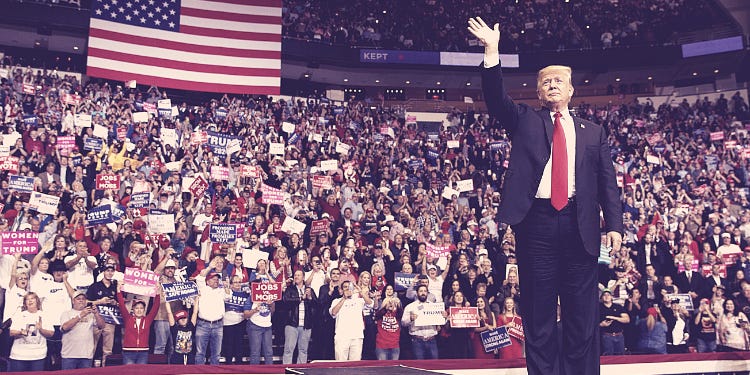Earlier this week, Republicans and Democrats struck a tentative budget deal to avert another government shutdown. As part of the deal, President Trump would get $1.375 billion for a border barrier funding — a far cry from the $5.7 billion he had been demanding (after long promising that Mexico would be flipping the bill). Additionally, the agreement specifically forbids the use of a concrete wall (which the president heavily campaigned on in the 2016 election) and also any of the new prototype walls we've heard so much about. This reduces the best case scenario for new coverage to approximately 55 miles of standard border fencing.
This would seem like a fairly devastating political defeat for the president, but it's even worse than you probably think.
Back in June of last year, Senate appropriators had actually agreed to $1.6 billion in border barrier funding — the very amount that the administration, at the time, was requesting. And even in the fall, after Trump instead began demanding $5.7 billion (in response to anger from the Ann Coulter wing of the Republican Party), Chuck Schumer began Democratic negotiations at $1.6 billion. That number dropped a bit as the political fight escalated.
In other words, it took the longest government shutdown in U.S. history (a brilliant and gutsy bargaining chip, as his supporters framed it) for Trump to get less money than the senate was willing to give him prior to the shutdown.
This doesn't exactly bolster the often repeated theme that our president is a master negotiator and deal-maker.
According to Tony Schwartz, the guy who actually wrote Trump's iconic bestseller, The Art of the Deal, the notion was a farce from the get-go. If you haven't read Schwartz's thoughts on the topic, you really should. They're rather extraordinary and provide some good insight into why the narrative has long been, at best, disingenuous.
Schwartz has often expressed regret over having ever created what he considers a fictional persona:

Now, to be fair, Trump clearly has a knack for sealing deals with a significant portion of the electorate. He won an election in which he was a clear underdog. He commands the unwavering loyalty of many evangelical voters (and even evangelical leaders), despite his vast moral failings. He has even managed to make a lot of Republican voters (including most folks in the conservative media) forget all about longtime party tenets like fiscal conservatism (our national debt just topped $22 trillion, with trillion-dollar annual deficits in the foreseeable future) and free markets (the unnecessary trade war rages on).
But Trump has connected with the Republican base on a personal and rather intimate level. And as John Lithgow somewhat famously said in 1993's Cliffhanger, real love is sacrifice.
Yes, I felt compelled to tie this piece to Valentine's Day somehow. You're welcome, America.
But in all seriousness, successfully selling yourself as a presidential candidate is no small feat. And in the realm of executive and constitutional authority (which doesn't really require the art of negotiation), Trump has made some very good judicial nominations, and has signed into law some pretty decent congressional bills (of which he notably had little input).
But when it comes to actual deal-making prowess as the President of the United States, the question has to be asked: Has Trump demonstrated any?
Have we enjoyed any gains of note in our trade face-off against China? Despite Trump's claim that our government is getting rich off of tariffs (that money is actually coming from Americans), what we've seen is a lot of suffering in multiple U.S. industries (most notably the automobile and farming industries). Many billions of dollars have been lost from the private sector, with some of those billions being "recouped," in the form of bailouts, by U.S. taxpayers.
Have we gotten anywhere on North Korea? One would think so, with all of the flattery and legitimacy our president has been showering on Kim Jong-un. But despite Trump's famous declaration that the North Korean nuclear threat is over, we've seen virtually nothing on this front (thus far) other than some nationally humiliating photo-ops and the dictatorial regime's traditional spewing of dishonest claims and empty promises.
Obamacare still lives. Trump won't even allow entitlement reform on the table (boy, could that issue use a skilled, executive-level negotiator). And again, despite Trump's claim that a far-stretching border wall will be paid for by Mexico (now via the new trade agreement, which isn't much different than the old trade agreement), what we're looking at is 55 miles of fence, paid for by Americans. And if the president follows through with a "national emergency" order to get additional fencing (or whatever), Americans will be paying for that as well.
If I'm missing the fruits of some savvy presidential negotiation, perhaps someone can tell me what it is.
Fortunately for the president, the resounding defeat of his top-priority political initiative (along with his marquee leadership attribute as a candidate) won't make much of a difference to his base. Neither will the fact that Trump was in a far better position to make progress on this issue when his party controlled both branches of Congress (which makes you wonder why he didn't). The base will of course blame this all on The Swamp, and chants of "build the wall" will continue on at Trump rallies like nothing ever happened.
After all, when the real deal being negotiated is the fight, and not necessarily an outcome, it's not all that hard to make the sale. —





